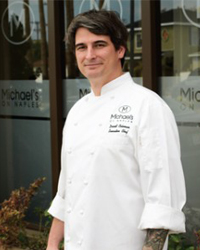Had it not been for his frustration four years ago, Chef David Coleman  might not pay the same attention to sustainability practices as he does today. After a series of phone calls, Coleman found out that he was not alone amongst proprietors and farmers who were seeking outlets to both buy and sell meat that was raised with integrity. He sought this integrity in the form of sustainability practices such as appropriate feeding, raising and marketing.
might not pay the same attention to sustainability practices as he does today. After a series of phone calls, Coleman found out that he was not alone amongst proprietors and farmers who were seeking outlets to both buy and sell meat that was raised with integrity. He sought this integrity in the form of sustainability practices such as appropriate feeding, raising and marketing.
The first step in Coleman’s sustainability overhaul at Michael’s on Naples starts outside the walls of the restaurant and within his interaction with his supplier. Not only does establishing a good relationship with an honest supplier ensure that Coleman “knows his meat,” it also allows room for bargaining. When buying a 250 pound pig, one can pay on average between three and seven dollars a pound. “It depends on you and your salesman the relationship you’ve developed. It’s a lot like playing cards,” says Coleman.
The likes of whole duck, quail, lamb, pig, jidoris, and rabbit are served seven days a week at Michael’s on Naples. Buying in bulk is a major force behind Coleman’s ability to keep whole animal on the weekly roster. Sustainability translates to three cardinal concepts in his opinion. “Sustainability is about doing what is right, ensuring that the way the animal is being raised, fed and marketed is viable and can continue. It’s about being accountable for the slaughter of the animal and doing your best to assure that the full yield of the animal’s life is being purposed properly, but accountability is not only to the animal but also to our customer. Lastly, buying whole animals and putting them in the hands of a skilled butcher and/or food manager can be financially beneficial to the restaurant in terms of food cost.”
When Coleman says whole animal,’ he means whole animal. His team butchers in-house, a process which can take one to three hours depending on the type of animal and its intended use. Coleman ensures optimum use of all of the animals served at Michael’s on Naples. For example, he braises less frequently used parts of the lamb like the shoulder and neck. He also breaks down lamb leg muscles to grill as steaks. “Using the whole animal allows for a good, flavorful bone stock which, in turn, always yields a great reduction sauce,” remarks Coleman.
Coleman’s seven years experience with serving whole animal combined with his preoccupation over the last four years with viable practices has given him the tools to execute a successful method of sustainability. Coleman and his team are determined to top themselves and the successes of other establishments. “This should be on the mind of every chef,” says the chef intent on serving delectable meals in a sustainable way.











